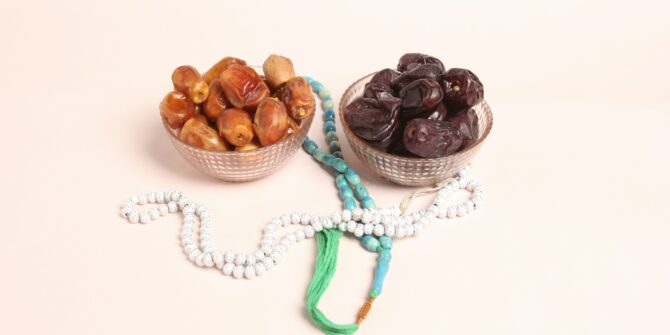Written by Halah Alareeki for Nest Integrative Wellness
The blessed days of Ramadan are upon us. Ramadan is the month when Muslims fast from dawn until sunset, refraining from food and water (excluding exempted persons). This is the month of spending more time in reflection, community, and spiritual growth.
We all want to take advantage of Ramadan and reap as much benefit as we can. This can include planning for Suhoor (pre-dawn meal) and Iftar (breaking of fast) meals ahead of time while ensuring you have enough energy to go by your days and nights.
I have prepared some valuable tips to help you have an
energetic and nourished Ramadan this year Insha’Allah.


Tip: if you struggle with including 8-10 cups of plain water per day for hydration and bowel regularity in Ramadan, consider including lemon water, sparkling water, smoothies, coconut water, soups, or hydrating foods like watermelon, pineapple, berries, romaine lettuce, or cucumber.
1-3 small dates, 1-2 cups water or 1 cup milk
rest/pray
lentil soup, 1-2 samosas, ¼ plate chicken, ¼ plate Freekeh, ½ plate Fattoush salad, and ¼ cup plain yogurt with cucumber
1 cup fruit, ¼ cup of mixed nuts, small piece of dessert, mint or ginger tea (for digestion)
Fun fact: dates are high in potassium and a great source of , magnesium, and B vitamins. While milk is high in calcium and water. Having both at iftar helps in replenishing hydration and electrolytes upon breaking the fast and acts as a Sunnah practice. Add additional protein to dates like tahini, nuts, or nut butter to stabilize blood sugars.

Lastly, if you are pregnant, breastfeeding, or managing a condition such as diabetes yet choose to fast, it is always best to review your specific nutritional needs with a dietitian to ensure your optimal health and Ramadan experience.
I hope everyone observing this month has a wonderful Ramadan.
Ramadan Mubarak!
Halah Alareeki, RD

Give the gift of wellness, relaxation and self-care! Treat someone special to a gift card – the perfect present for a healthier, happier life.